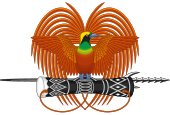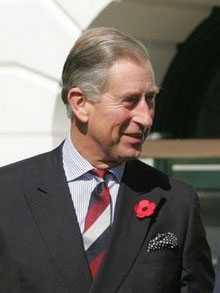Monarchy of Papua New Guinea
This article needs additional citations for verification. (April 2008) |
| Queen of Papua New Guinea | |
|---|---|
 | |
| Incumbent | |
 | |
| Elizabeth II | |
| Details | |
| Style | Her Majesty |
| Heir apparent | Charles, Prince of Wales |
| First monarch | Elizabeth II |
| Formation | September 16, 1975 |
 |
|---|
|
|
The monarchy of Papua New Guinea is a system of government in which a hereditary monarch is the sovereign of Papua New Guinea. The present monarch is Queen Elizabeth II, who Papua New Guinea shares as head of state with a number of Commonwealth realms.[1] The monarch is constitutionally represented by the Governor-General of Papua New Guinea, whose roles and powers are laid out by the Constitution of the Independent State of Papua New Guinea.
International and domestic role
54 states are members of the Commonwealth of Nations. Sixteen of these countries are specifically Commonwealth realms who recognise, individually, the same person as their Monarch and Head of State; Papua New Guinea is one of these.[2] Despite sharing the same person as their respective national monarch, each of the Commonwealth realms — including Papua New Guinea — is sovereign and independent of the others.
The Balfour Declaration of 1926 provided the dominions the right to be considered equal to Britain, rather than subordinate; an agreement that had the result of a shared Crown that operates independently in each realm rather than a unitary British Crown under which all the dominions were secondary. The Monarchy thus ceased to be an exclusively British institution, although it has often been called "British" since this time (in both legal and common language) for reasons historical, legal, and of convenience. The Royal and Parliamentary Titles Act, 1927 was the first indication of this shift in law, further elaborated in the Statute of Westminster, 1931.
On all matters of the Papua New Guinean State, the monarch is advised solely by Papua New Guinean ministers.
Title
For Papua New Guinea, the Queen's official title is: Elizabeth the Second, Queen of Papua New Guinea and of Her other Realms and Territories, Head of the Commonwealth, as stated by section 85 of the Constitution of the Independent State of Papua New Guinea.
This style communicates Papua New Guinea's status as an independent monarchy, highlighting the monarch's role specifically as Queen of Papua New Guinea, as well as the shared aspect of the Crown throughout the realms. Typically, the Sovereign is styled Queen of Papua New Guinea and is addressed as such when in Papua New Guinea, or performing duties on behalf of Papua New Guinea abroad.
Constitutional role
The role and powers of the monarch are set out in the Constitution. The Preamble to the Constitution states ‘that all power belongs to the people—acting through their duly elected representatives’. Nevertheless, according to section 82 of the Constitution, ‘1) Her Majesty the Queen— (a) having been requested by the people of Papua New Guinea, through their Constituent Assembly, to become the Queen and Head of State of Papua New Guinea; and (b) having graciously consented so to become, is the Queen and Head of State of Papua New Guinea.' She is referred to in the Constitution as ‘Head of State’.
All powers of state are constitutionally derived from the people, (Preamble) through the Constituent Assembly (sec.82). These powers are entrusted to the Head of State, who is represented by the Governor General of Papua New Guinea — appointed by the Monarch upon the nomination of the National Parliament of Papua New Guinea the Monarch is informed of the Prime Minister's decision before the Governor General gives Royal Assent.
Duties
Most of the Queen's domestic duties are performed by the governor-general. The governor-general represents the Queen on ceremonial occasions such as the opening of parliament, the presentation of honours, and military parades. Under the constitution, he or she is given authority to act in some matters, for example in appointing and disciplining officers of the civil service and proroguing parliament. As in the other Commonwealth realms, however, the monarch's role, and thereby the viceroy's role, is almost entirely symbolic and cultural, acting as a symbol of the legal authority under which all governments operate and the powers that are constitutionally the Crown's are exercised almost wholly upon the advice of the Cabinet, made up of Ministers of the Crown. Since the death of Queen Anne in 1714, the last monarch to head the British cabinet, the monarch "reigns" but does not "rule". In exceptional circumstances, however, the monarch or viceroy can act against such advice based upon his or her reserve powers.
There are also a few duties which must be specifically performed by, or bills that require assent by the Queen. These include: signing the appointment papers of governors-general, the confirmation of awards of honours, and approving any change in her title.
Succession

The constitution provides that the Queen's heirs shall succeed her as head of state. Succession to the throne is by male primogeniture and governed by the provisions of the Act of Settlement, as well as the English Bill of Rights. This legislation lays out the rules that the monarch cannot be a Roman Catholic, nor married to one, and must be in communion with the Church of England upon ascending the throne.
The heir apparent is Elizabeth II's eldest son, Prince Charles, Prince of Wales.
Legal role
All laws in Papua New Guinea are enacted with the sovereign's or viceroy's approval, the granting of which to a bill is known as Royal Assent. The viceroy may reserve a bill for the monarch's personal decision on the bill; the monarch has the power to disallow a bill within a time limit specified by the constitution.
The sovereign is deemed the "fount of justice," and is responsible for rendering justice for all subjects. The sovereign does not personally rule in judicial cases; instead, judicial functions are performed in his or her name. Common law holds that the sovereign "can do no wrong"; the monarch cannot be prosecuted in his or her own courts for criminal offences. Civil lawsuits against the Crown in its public capacity (lawsuits against the government) are permitted; however, lawsuits against the monarch personally are not cognizable. The sovereign and, by extension, the governor-general, also exercises the "prerogative of mercy" and may pardon offences against the Crown. Pardons may be awarded before, during, or after a trial.
The legal personality of the state is referred to as "Her Majesty the Queen in Right of Papua New Guinea." For example, if a lawsuit is filed against the government, the respondent is formally described as Her Majesty the Queen in Right of Papua New Guinea.
History
Papua New Guinea (PNG) was toured by Prince Charles (later the Prince of Wales) in 1966, while he was a student in Australia. He returned in 1975 to represent the Queen at PNG's independence celebrations. He then opened the new parliament building in Port Moresby.[3]
References
- ^ The Monarchy Today > Queen and Commonwealth
- ^ The Monarchy Today > Queen and Commonwealth > Members
- ^ "Prince of Wales and Duchess of Cornwall to make Australian visit", The Telegraph, 19 September 2012, retrieved 21 September 2012
